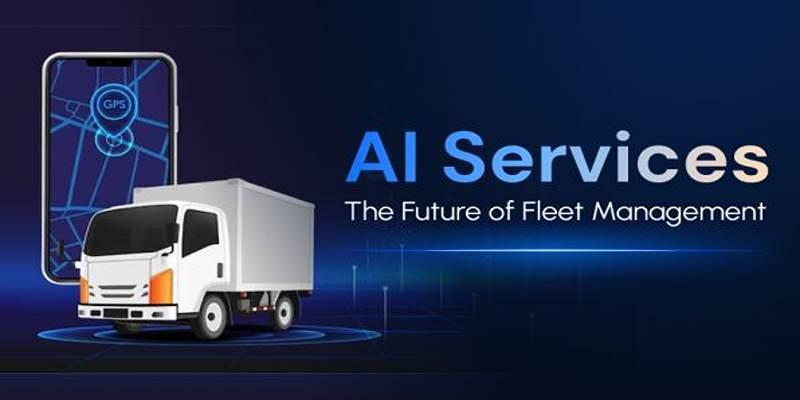Different fields have changed a lot because of Artificial Intelligence (AI), and fleet management is no different. A lot of logistics and delivery services depend on managing fleets, and AI apps are helping them a lot. AI is a key part of making operations more efficient, cutting costs, and making customers happier. It does this by doing things like route optimization and predictive repair. This post will talk about how AI is improving transportation and delivery services by making them smarter, faster, and more efficient.
What is AI in Fleet Management?
AI in fleet management involves using artificial intelligence technologies to automate, streamline, and enhance the management of vehicle fleets. It includes tasks like monitoring vehicle performance, optimizing routes, ensuring driver safety, and predicting maintenance needs. AI leverages data gathered from various sensors, GPS systems, and telematics to make real-time decisions that improve the overall efficiency of logistics and delivery operations.
AI-Powered Route Optimization: Getting Deliveries Faster and Cheaper
Route optimization is one of the most powerful applications of AI in fleet management. AI can process real-time data on traffic, road conditions, and even accidents to determine the best route for delivery trucks, helping them avoid congested roads or detours. It not only speeds up deliveries but also reduces fuel consumption, which translates into significant savings for fleet owners.
AI algorithms take into account various factors, such as:
- Traffic conditions: AI can tell you ahead of time about traffic jams or crashes and suggest other routes.
- Weather conditions: AI changes delivery routes so that bad weather, like snowstorms or heavy rain, doesn't cause delays.
- Road closures or construction zones: Using AI, drivers are warned ahead of time when roads are closed or there are work zones, which keeps traffic moving smoothly.
It shortens delivery times, makes customers happier, and improves the general efficiency of operations.
Predictive Maintenance: Reducing Downtime and Improving Fleet Reliability

In fleet management, Predictive Maintenance is a key part of AI. AI-powered systems constantly check the performance of cars by gathering information from the fleet's many sensors. These systems can find small problems before they get worse, which lets fleet managers plan upkeep and repairs ahead of time.
It helps prevent:
- Unexpected breakdowns: Vehicles can be serviced before a breakdown occurs, minimizing downtime and avoiding delays in deliveries.
- Costly repairs: By identifying small problems early, fleet owners can avoid expensive repairs that might have resulted from neglect.
- Increased fleet reliability: Predictive maintenance ensures that vehicles are always in good condition, leading to fewer service disruptions and ensuring on-time deliveries.
Fuel Efficiency: Lowering Costs and Reducing Environmental Impact
AI also plays a crucial role in improving fuel efficiency within fleet management. By analyzing data on driving behavior, AI can suggest adjustments to driving patterns that can reduce fuel consumption. For example, AI can identify instances where drivers are speeding, idling for too long, or accelerating rapidly, all of which contribute to higher fuel usage.
Fleet managers can use this data to:
- Encourage fuel-efficient driving: By offering incentives for fuel-efficient driving practices, companies can reduce fuel consumption.
- Track fuel usage patterns: AI allows fleet managers to monitor fuel consumption patterns, ensuring vehicles are being used efficiently.
- Reduce environmental impact: With lower fuel consumption, AI helps reduce the overall carbon footprint of the fleet.
Driver Safety: Real-Time Monitoring and Feedback
Driver safety is a critical concern in fleet management, and AI can significantly improve safety standards. AI systems equipped with advanced telematics and driver monitoring tools can track driver behavior in real time, providing instant feedback on unsafe driving habits.
AI can monitor for:
- Speeding: Alerts can be sent to the driver if they exceed the speed limit.
- Harsh braking or acceleration: AI detects abrupt driving actions and provides feedback to the driver to improve behavior.
- Fatigue detection: AI systems can monitor signs of driver fatigue, such as prolonged driving hours, and prompt drivers to take necessary breaks.
These real-time alerts help reduce accidents, ensure compliance with safety regulations, and promote better driving habits, leading to safer operations.
How AI Enhances Customer Satisfaction in Delivery Services
AI has a direct impact on customer satisfaction by ensuring faster, more reliable deliveries. Customers today expect real-time updates on their orders, and AI systems can deliver on these expectations by providing:
- Real-time tracking: AI allows customers to track the location and estimated delivery time of their orders in real time.
- Accurate ETAs: With AI-powered route optimization and predictive maintenance, delivery times are more accurate, which helps improve customer experience.
- Fewer delays: AI reduces the chances of delays by optimizing routes, predicting maintenance, and improving overall fleet management efficiency.
As a result, customers are more likely to return to a service that offers fast, reliable, and transparent delivery experiences.
The Future of AI in Fleet Management

As AI technologies continue to advance, the future of fleet management looks promising. Some of the most exciting innovations on the horizon include:
- Autonomous Vehicles: Self-driving trucks and delivery vehicles are becoming more feasible with the advancements in AI, potentially reducing human error and improving delivery speed.
- IoT Integration: The Internet of Things (IoT) will allow for even more comprehensive fleet management by enabling smarter vehicles and infrastructure that work in tandem with AI.
- Blockchain for Fleet Security: AI combined with blockchain technology can provide a more secure and transparent system for tracking deliveries, managing payments, and ensuring the integrity of logistics operations.
Conclusion
AI is revolutionizing fleet management and transforming logistics and delivery services. From optimizing routes and ensuring predictive maintenance to improving fuel efficiency and driver safety, AI offers significant advantages for businesses in the transportation sector. As AI continues to evolve, fleet management will become even more efficient, reducing costs and enhancing customer satisfaction. Companies that embrace AI-powered solutions will be better positioned to thrive in a competitive, fast-paced delivery environment.
